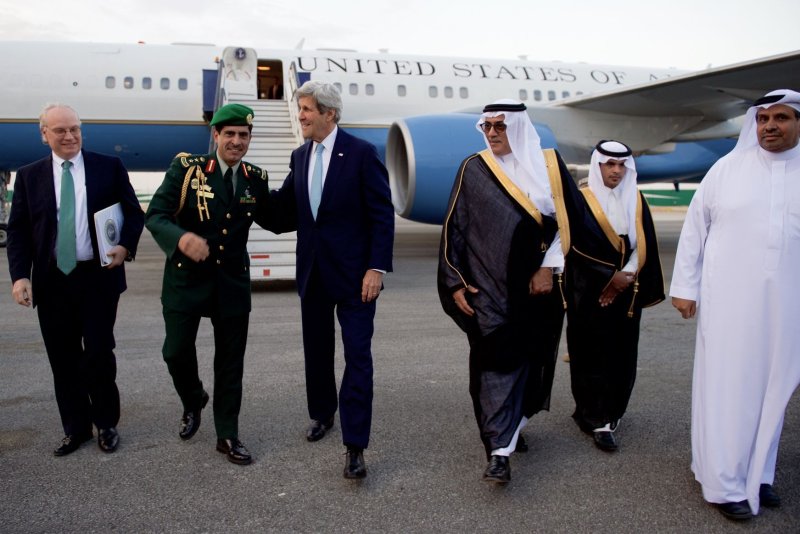U.S. Secretary of State John F. Kerry walks with U.S. Embassy Riyadh Chief of Mission Timothy Lenderking and Saudi military and protocol officials after arriving at King Salman Air Base in Riyadh, Saudi Arabia, on April 20, 2016. Thursday, some lawmakers began acknowledging potential problems with the new law it passed Wednesday -- overriding President Barack Obama's veto -- that allows families of terror victims to sue foreign governments shown to sponsor terror. The White House called it a classic case of "rapid onset buyer's remorse." File Photo by U.S. Department of State/UPI |
License Photo
RIYADH, Saudi Arabia, Sept. 29 (UPI) -- Part of the fear President Barack Obama had about Congress' new law to allow families of terror victims to sue foreign governments is now becoming a reality in Saudi Arabia.
Just one day after both houses of Congress voted to override Obama's veto of the Justice Against Sponsors of Terrorism Act (JASTA) -- pushing it into law -- the United States' longtime Persian Gulf ally began bristling.
Also Thursday, some lawmakers who voted for the override slowly began realizing that the controversial bill might bring some unintended consequences -- reluctantly giving the president free license to say, "I told you so."
Various news reports Thursday said the new law's got some in Riyadh rethinking the country's relationship and support for the U.S. government -- an uneasy but strong alliance that's been the root of all kinds of tension for Saudi Arabia over the last few decades.
"JASTA is a wake up call for the Saudis, that it is time to revisit the concept of the alliance with the United States," Saudi political sociologist and writer Khalid al-Dakhil said in a report by The New York Times.
Some reports Thursday said Riyadh might also cut off some of its airspace it allowed the Pentagon to use for military operations, as well as threatening to disrupt billions of dollars it contributes to the American economy.
Obama rejected the bill out of concern that it could make things dicey for U.S.-Saudi relations, hamper cooperation, complicate foreign policy matters and weaken national security.
"The JASTA would be detrimental to U.S. national interests more broadly, which is why I am returning it without my approval," the president wrote in his veto message. "JASTA threatens to create complications in our relationships with even our closest partners.
"By exposing these allies and partners to this sort of litigation in U.S. courts, JASTA threatens to limit their cooperation on key national security issues ... at a crucial time when we are trying to build coalitions, not create divisions."
Many in the Saudi government reacted to Congress' override Wednesday with anger and disappointment -- some of whom feel betrayed after decades of the Persian Gulf nation standing by the United States on a great number of issues, some of which have seriously weakened Riyadh's own security in a region where most governments oppose Washington's policies.
Though JASTA doesn't specifically target Saudi Arabia, it's most immediate impact favors relatives of 9/11 victims who desire to take civil action against the Saudis over purported ties to some of the 9/11 plotters.
"Because the bill has been tied so strongly to 9/11 and Saudi Arabia, it helps feed this perception that Saudi Arabia is somehow responsible for Islamic terrorism," Saudi businessman Faisal bin Farhan told the Times. "And that to me is more worrying than any direct effect of the law itself."
Thursday, the White House slammed Congress for forcing the bill into the books, and pointed out that some lawmakers on Thursday are beginning to realize there may be some major problems with the new law -- such as infinite liability it could place on American servicemen and women.
"I'd like to think that there's a way we could fix it so that our service members do not have legal problems overseas," House Speaker Paul Ryan, R-Wisc., said.
"Nobody really had focused on the potential downside in terms of our international relationships," Senate Majority Leader Mitch McConnell, R-Ky., said, also placing some of the blame on Obama himself.
"It would have been helpful had we had a discussion about this much earlier than last week," he said.
The White House called it a classic case of "rapid onset buyer's remorse."
"It's hard to take at face value the suggestion that somehow they were unaware of the consequences of their vote," White House spokesman Josh Earnest said Thursday. "What's true in elementary school is true in the United States Congress -- ignorance is not an excuse, particularly when it comes to our national security and the safety and security of our diplomats and our service members."















